
A butterfly passes through several stages in its development. Egg, caterpillar, pupa, and finally a butterfly. I was soon to undergo a similar metamorphosis. My military days were coming to an end, and my past would not be part of my future. It would be wiped clean.
Sharm el Sheikh
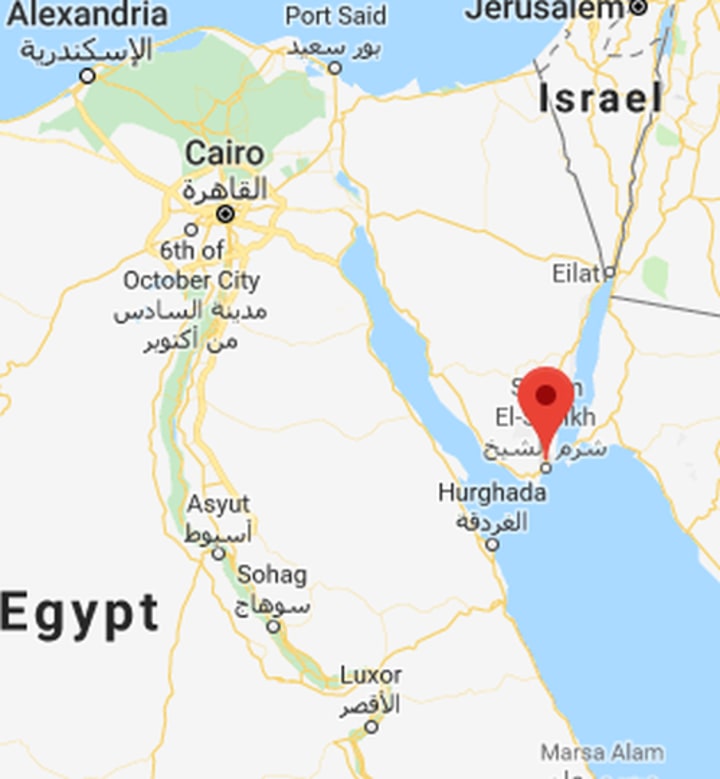
Sinai desert and Sharm el Sheikh
Shortly after deployment to the Mitla pass, our battery of anti-aircraft cannons were diverted to Sharm el Sheikh, or Sharem as we called it. It was at the southernmost point of the Sinai peninsula, where the Red Sea, Gulf of Suez, and the Gulf of Aqaba meet.
St. Catherine's Monastery
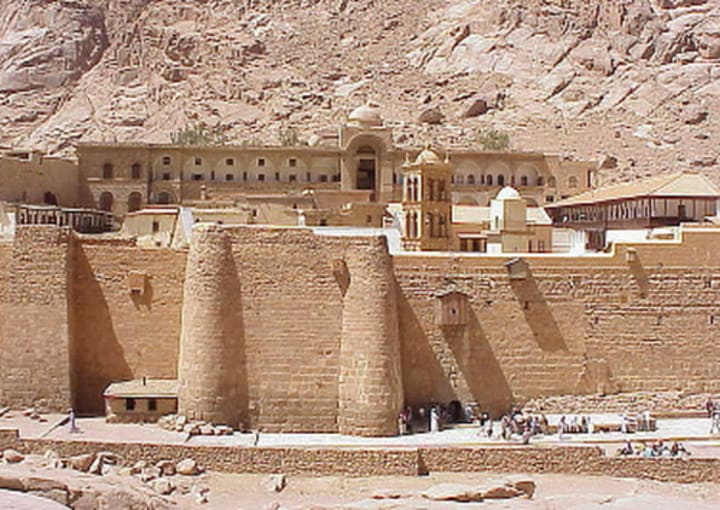
UNESCO world heritage
On the way south, our convoy passed by St. Catherine's Monastery. Today it's a UNESCO world heritage location, and it's history goes back to the fourth century AD. Although unscathed by the war, I noticed that there were a lot of furnishings thrown outside the perimeter walls. Tables, chairs, and other items. Didn't think more about it at the time.
Sharm el Sheikh
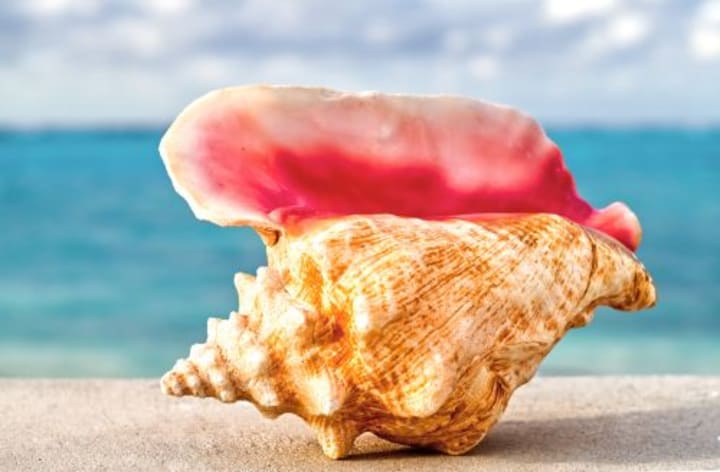
Seashells were strewn all over the beach
In '67, Sharm el Sheikh was mainly an air force base, and very little else. With the war over, it was back to the normal operating routine of the battery. Maintenance of the equipment, perimeter security of our area, and organising entertainment for the crew of the base. That wasn't really part of the routine, but why not? Sometimes you need to improvise. Apart from ourselves, there were pilots, ground crew, and office staff. The air force had the best looking girls in the army. No idea why or how, but it was a fact. Also, Sharem did have something very special—exceptional shorelines and diving areas. At the time it was easy to pick up the large seashells off the beach until a law was passed forbidding it. Of course, I would not recognise the area today. Many Brits, Scandinavians, and numerous other Europeans are aware there are superb resorts spread all over the area, and Sharem has become one of the go-to areas for European tourists looking for sun, beaches, and diving.
Artillery

Artillery insignia
Following the '67 war, the anti-aircraft branch of the artillery was officially transferred to the air force. It was decided that the needs of the air force had precedence over the artillery with our particular experience and weaponry, and we were needed closer to airport bases, and not front lines. We had to change our black berets with an artillery insignia, and green uniforms to light grey uniforms, blue berets, and the air force insignia.
Airforce
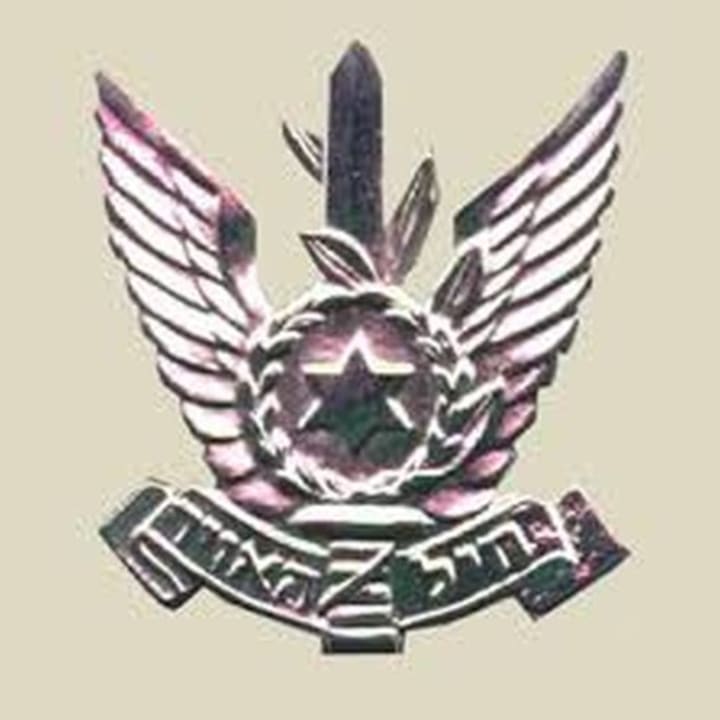
Airforce insignia
For now, there was no more running up and down hills. Instead, we swapped that for a period in the desert. Not the easiest of climates to contend with, but it was a welcome alternative to the endless and strenuous courses since joining up. We didn't have a lot to do. The weather there was hot and dry. No, not hot. Super hot. You couldn't touch the cannon in the heat of the day, and you didn't need a frying pan to fry an egg either. Could easily be done on the cannon itself. One of the highlights during my time there was a severe earthquake somewhere in the Red Sea. I was in my tent at the time, but when the ground shook like that, it was a strange feeling. It was even stranger to see five-ton cannons jumping off the ground.
First discotheque in Sharm el Sheikh

In 1967, there was no discotheque in Sharm el Sheikh. No cornerstone bearing my name. However, I can stake a claim to having built the first ever disco in Sharem. Not by myself of course. It was a team effort, but considering we didn't have a local IKEA or shopping mall to purchase our needs, it was nothing short of miraculous, and something we could be proud of. I'd remembered seeing the furniture thrown outside the walls of St. Catherine's Monastery, and I requested from the CO a truck, and a couple of guys to go and see if we could salvage anything. It was over a 400km round trip, so we needed the officer's permission, but considering everyone was bored out of their minds doing nothing all day, it was an easy decision for him to make. So off we went. Arriving at the monastery, which was closed to outsiders at the time (surprisingly there were no tourists about), we found lots of materials we could use. chairs, benches, curtains, mirrors, and more. We had nobody to ask, so we just loaded everything and set course back to base. One of the guys brought back a huge speaker, and the music came from records. Within days, we had a fully functional disco, including the mirrored globe, constructed of a paper mache ball, and a mirror broken into 1000 pieces—not good for the superstitious.
Officers course first stage

Officers course 1st stage
No sooner had we settled down and we were summoned back to central Israel for, yes, you guessed it, another course. Officer's course part one. Have another guess at what that consisted of? You got it—running up and down hills. The overnight treks were longer, navigation by stars was fun, especially on a cloudy night, and role-playing.
When there's no Motel 6 in sight
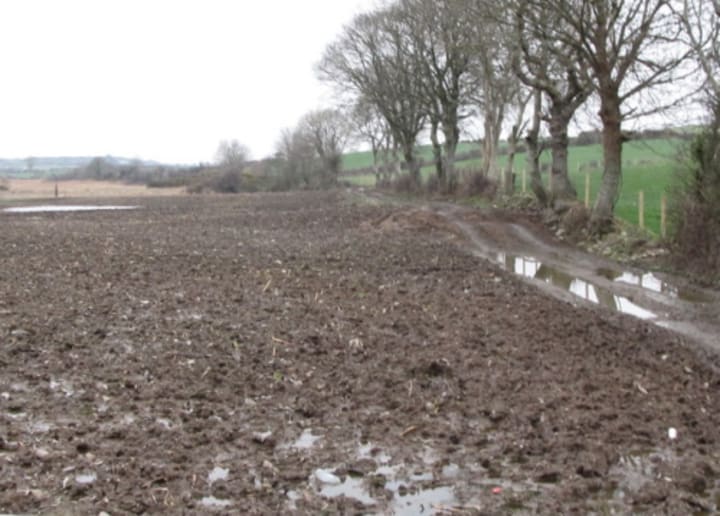
Have a good night
One night, midwinter, we had a 30km long trek stretching from Haifa going south over the mountains. It was pouring with rain that night. It was no stroll in the park. With full army kit weighing app. 12-15 kgs, your own personal weapon, helmet on head, the Carmel mountain range was cold, and we were wet through to the skin. Marching in threes in the dead of night, silence except for the squishy sound of boots on a wet muddy path. Around midnight we arrived at a newly ploughed field. That's when the staff lieutenant gave the order to make camp. Keep in mind, all we had was our personal backpack, and small attached collapsible spade. We looked at each other and wondered 'where' to make camp exactly. We didn't have tents, and we were soaking wet. So, for those that didn't understand the message, and that stood for all of us, one of the sergeants took his small spade, dug into the soaked earth and created a trench about 40 inches deep until he reached dry soil beneath the newly ploughed soil. For pillows, we were told to use our boots and to cover the trench with our military raincoats. Some things are not forgotten. It actually worked, and within 10 minutes, we all disappeared, and slept for about three to four hours. I'm trying to imagine what it looked like to the officer and sergeants. About 40 of us there one moment, and woosh, gone the next. There was no TARDIS there. We really disappeared into the ground. Towards dawn, a command car arrived with semi-hot watery tea and some breakfast. Wasn't cornflakes of porridge. Maybe a cold fried egg and roll of bread if we were lucky.
Officers course second stage

My officer's course was made up of two separate courses. One was Ba'ad Achad, which, as mentioned, was much of the same, but harder. The second stage was all about anti-aircraft training and deployment.
Going back over my first three to four years in Israel, having arrived in 63, it was now 67, there was never any real effort to learn the language. I was kicked out of the kibbutz after a short time, because I got my priorities wrong; I quit school because I was asked to stay a year behind, and that was not something I could contend with, and then I went into the merchant navy, which was English based studies. During my first year in the army there were some humorous instances, which were a result of my Liverpudlian accent, and lack of Hebrew. But now, in the second stage of officer's training, things became a bit more difficult. From the first stage, I received the officer's insignia, a small badge that goes on the lapel or shirt collar, but I didn't receive my second lieutenant bar on my shoulder. I still had the white plastic on the shoulder showing I was a cadet. To get the bar or rank, I needed to complete the second stage.
Operating an anti-aircraft battery

The course was at a base close to Hertzliya. The base no longer exists at that location. The physical part of the officer's course was toned down, and we had to learn the theory of anti-aircraft operations. I will admit, I was struggling, but allowances were being made for me. Because of my dad's background in the British army, I stood out amongst the rest. My regular issue boots shone more than officer's first-grade boots. My dad would spend hours shining them when I came home at weekends with a spoon, elbow grease, spit, and polish. He also polished the brass buttons on my army jacket. I know he was proud of me. My uniform was pressed immaculately, and I wouldn't allow Rose to do it for me. I ironed my uniform. I took great pride in my appearance, and it was very obvious. I was probably earmarked for a position that included my proficiency in English, and my professional appearance. However...
Two weeks before the end of a six and a half month officer's course, I had a disagreement with the CO of the base. It was a stupid mistake that cost me dearly. It was a Thursday evening, and there were about 12 of us, and we were told to gather on the basketball court. The CO sent a truck into town to bring in about a dozen ladies, and to have them teach us folk dancing. This was before the Richard Gere film An Officer and a Gentleman. Sounds bonkers right now when I think of it, but it was true. He obviously wanted us to be more than just officers, but I don't really know which planet he came from. It could be debated whether this was an integral part of the course, but it's water under the bridge now.
While on the basketball court, I received a message from the guard at the gate that someone was waiting for me. Didn't have a clue who or what, but asked the Sgt. major if I could go to the gate. He said yes. I ran up to the gate and saw my girlfriend of three years, Rebecca, from my home town, who was serving in the northern command of the intelligence corps. It was dark in the area of the base as we were amongst a lot of orange groves. As it was an informal evening of dancing, I brought her into camp and to the basketball court. She joined in the dancing. The CO didn't like it. She was unknown to him, and he sent the Sgt. major to tell me to get her out of camp. I asked for a jeep, so I could at least get her into town. Permission was given.
Following morning I was court-martialed. The Sgt. major walked me into the CO's office, and for bringing an unknown soldier into camp, he said I was to remain in camp for the remaining two weeks of the course with no home leave. I was expecting to go home that day, and had told Rebecca I would see her that evening.
I'm a quiet guy and do my best not to argue, however, this annoyed me, and I questioned the CO's punishment by saying it was okay for him to bring in 12 civilian girls, but for me to bring in a female soldier from the intelligence command it was wrong. He didn't like the fact I answered back, and guess what? Six months of the officer's course went down the drain. I was dismissed from the course that day. Should I have been dismissed for arguing with a CO? Yes. Was he right? No. The result would always be the same. You don't question a CO's orders, but I don't think it was fair. However, there is no 'fair' in the military. You do as you're told.
I was told to take a 'regila', and come back as a platoon sergeant for new recruits. I did, but when I came back, I wanted the last word and wasn't done with the CO. Part of my duties were to teach drill marching. Marching in-step in three's with arms swinging, and gun on shoulder. I decided to get my own back at the CO. I taught the soldiers to swing their arms very sharply to shoulder level, more like the Chinese or East European soldiers and raised steps. That is not the Israeli style. Israeli style is more relaxed, and less sharp and only half way to the shoulder. Not only did I teach them to march like the Chinese army, but I also paraded them along the road opposite his office, back and forth, back and forth. That really got up his nose, but as I wasn't breaking any laws, and he couldn't do a lot, except kick me out of camp. First I was sent on a Hebrew course, at last, and then transferred to Ramat David, which is the northern air force base. I didn't care. I kind of lost it after 18 months of courses, and being kicked out of the officer's course two weeks before the end. I decided to really enjoy the remaining 18 months, and do things my own way. I did. But, I was counting the days remaining. I wanted out. For the last six months of service, I kept a countdown chart I made with 180 little squares, and each day I would cross one off. Exactly three years after joining on August 18, 1966, I discharged. It was August 14, 1969.
What does this photo tell you...

I had been in the army for three years. TEN months more than what I expected when I joined. Usually, if you do more than you expect it's because you had been imprisoned, but still had to complete your regular time. We called it 'keva dafuk'. I hadn't been in prison* as yet. Came pretty close I guess, but I hadn't.
The army was an experience, and I wouldn't want to have missed it under any circumstances. I would have preferred the other choice of signing on in the navy, but you can't change history. Overall, I'm happy I contributed like everyone else, and, if I had to do it all over again, I would have made the same choices, despite my preferences.
However, now it was August 1969, and I was a civilian again. What had I learned in the past three years? I could certainly run up and down hills, but what else? If you join and learn a trade then it's time well spent, but if after three years all you have learnt is to run up and down hills, it's not time well spent. For all intents and purposes, I was back to where I was August 16, 1966. But I was now 19.5 yrs old. The photo represents a feeling of freedom.
* I would eventually end up in prison. A real prison.
No direction and no GPS

I hadn't finished school so there was no university option for me. I was kind of lost. Like finding yourself in the middle of an ocean, and not knowing where to go. My military discharge only gave me a few hundred dollars in my pocket with no advice on what to do.
I lived in Nahariya, which is in the north of Israel, however there was an office in Haatsmaut St, in Haifa, 30km's away, for assisting discharged soldiers in finding their feet, 'halishka le hachvanat hayalim meshuchrarim'. I decided to give it a go. I went along one day, and the staff asked how could they help me. I said I'd like to join the Mossad. They laughed and said it doesn't work like that. The Mossad look for you. Not the other way round. That's okay I said, but I want to try. With their smiles and probably funny faces behind my back, I filled out some papers, signed them, and left the office. Felt a bit daft as well.
A phone call out of the blue...

An anonymous call
Yes and no. When it came, I was surprised because after the experience at the office in Haifa, I wasn't really expecting anything to come of it.
But when it came, my heart missed a beat. I knew instantaneously where it was from. You don't get phone calls out of the blue. Nowadays you do, several times a day. Incessant spam calls. Back then there were no spam calls.
I was asked if I could come for an interview in Tel Aviv. My costs would be covered. Without a second thought, I agreed.
A new beginning. A new world. A new life
End of Part 4
I hadn't been dreaming or fantasizing about some kind of life, which included travel, danger, adventure, or about something far bigger than myself. I was a young Liverpudlian lad, had been in a street gang, who got into trouble for pinching cakes in a bakery. I hadn't finished school. I was 19 years old. A 6' 05" young man with blue eyes, and a fair complexion.
I was no Fleming's character, real or fictitious. James Bond was a fictional character, but Fleming's knowledge as an intelligence officer with the British secret service allowed him to mix fact and fiction, and the result became one of the most iconic names of the 20th century. James Bond 007.
Who wouldn't want a life like Bond's? You can fantasize all you like, but some things are beyond reach. So I thought.
Part 5 will cover the interview and the never-ending process to be accepted. Three different psychologists, maybe psychiatrists, just to make sure I wasn't some crazy fella from Liverpool.
About the Creator
P J
At 70 years old, it would be an understatement to say I've had an interesting and all-encompassing life. I hold two nationalities, speak two languages fluently and have two distinctly different personas. Not a split personality:-)




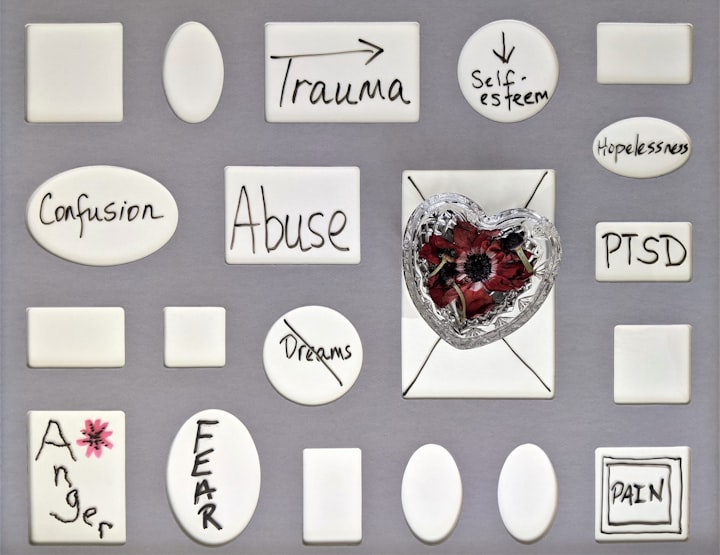

Comments
There are no comments for this story
Be the first to respond and start the conversation.